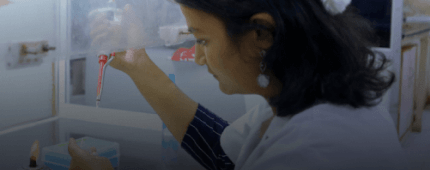M.Pharm. Pharmaceutical Analysis
- Home
- Medicine & Health Sciences
- SRM College of Pharmacy
- M.Pharm. Pharmaceutical Analysis
Campus
Kattankulathur (KTR)
Sanctioned Intake
15
Annual Fees
INR 1,75,000
Duration
2 Years
About the Programme
Eligibility
1. Candidate shall have passed a Bachelor’s degree in Pharmacy from a PCI approved institution.
2. Minimum of 50% aggregate of marks in Bachelor’s Degree.
3. Students should submit Pharmacist Registration Certificate obtained from the respective state pharmacy council at the time admission.
4. Age: Minimum age limit is 21 years on or before 31st December of year of Admission.
Program Outcomes
Domain Knowledge: Possess subjective knowledge of fundamental principles and core concepts related to Pharmaceutical Analysis, including points of intersection with interdisciplinary areas.
Planning abilities: Demonstrate effective planning abilities including time management, resource management, and delegation skills, instrumental and organisational skills. Develop and implement plans and organise work to meet deadlines.
Research Aptitude: Possess a keen interest in acquiring latest research developments in the area of drug quality check in general and pharmaceutical analysis in particular.
Modern practices: Identify and acquire, latest tools of analytical methods related to pharmaceutical analysis and allied science, and be able to deploy them with thorough understanding of their capabilities and limitations.
Professional Behaviour: Practice time management, resource management, organization skills and offer strategies to meet deadlines. Work in a team and participate in lifelong learning and continuous improvement in the profession
Critical thinking: Possess sufficient proficiency in problem solving skills, based on analytical thinking and research based approaches. Shall be able to identify and assess problems and find appropriate long term solutions to them.
Ethics: Practice and adhere to ethical principles in personal and professional life and strive to spread these virtues in the society. Respect people for their individual identity and be unbiased towards others with respect to race, cast and creed, culture, sex, physical and mental debility.
Communication skills: Speak, write, read and listen clearly in person and through electronic media in English and in at least one Indian language, and relate to the world by connecting with people, ideas, books, media and technology.
Conduct investigations of complex problems: Understand and contribute to analytical principles and computational tools through different models, softwares in order to provide solutions to complex matrices in drug analysis.
Environment and sustainability: Understand the effect of materials used in pharmaceutical analysis on environment, apply domain knowledge judiciously to minimize the negative impact of hazardous chemicals on environment from the view point of pharmaceutical research. To provide better greener analytical methods in the future.
Life-long Learning: Be open minded to keep acquiring latest tools and techniques related to pharmaceutical analysis from various sources and contribute to the existing knowledge by adding own experiences to the body of knowledge.
Program Educational Objectives
| PEO No | Education Objective |
| PEO1 | To educate information on the subject of pharmaceutical analysis, the course is developed. To benefit student understand and apply the principle involved in the determination and of different bulk drugs and their formulations, analysis of food components, and finished food products, the various modern analytical techniques, such as UV-Visible, IR, NMR, Mass, GC, HPLC, and different chromatographic methods, are instructed. |
| PEO2 | In addition to the theoretical components, the analysis-related fundamental practical knowledge is also provided. |
| PEO3 | The subjects covered by the Drug Regulatory Affairs themes are highly helpful in expanding knowledge of the regulatory facets of the pharmaceutical businesses. |
| PEO4 | The course includes a variety of hyphenated analytical instrumental techniques for drug characterization, quantification, and identification. The instruments used in analytical and biological samples include LC-MS, GCMS, and hyphenated procedures. |
| PEO5 | The different facets of pharmaceutical industry quality assurance and control were covered in this course. The essential topics covered include cGMP, QC checks, paperwork, quality certifications, GLP, and regulatory matters. |
Program Specific Outcomes
| PSO No | Specific Outcomes |
| PSO1 | Educate graduates in the fundamentals of several pharmaceutical sciences in accordance with the requirements of the pharmaceutical industry. |
| PSO2 | To prepare graduates for technical or professional employment in the pharmaceutical industry, institutions, or healthcare systems. |
| PSO3 | Enable graduates to practise their professions and adjust to a world with evolving trends. Enable graduates to pursue a lifetime of professional and personal growth while adhering to moral principles and having self-respect |
how to apply
Step 1 - register
Sign up or Register for CET with basic details (Name, Email ID, Mobile No., State, Gender and Password). Your Email ID will act as your Username for the portal while the password will be set by you upon registration.
On successful registration, you will receive the confirmation message on your registered contact number and Email. Use the Username and Password to Login to your CET Account.
Step 2 - register
Nemo enim ipsam voluptatem quia voluptas sit aspernatur aut odit aut fugit, sed quia consequuntur magni dolores eos qui rationeNemo enim ipsam voluptatem quia voluptas sit aspernatur
On successful registration, you will receive the confirmation message on your registered contact number and Email. Use the Username and Password to Login to your CET Account.
Step 3 - register
Sign up or Register for CET with basic details (Name, Email ID, Mobile No., State, Gender and Password). Your Email ID will act as your Username for the portal while the password will be set by you upon registration.
On successful registration, you will receive the confirmation message on your registered contact number and Email. Use the Username and Password to Login to your CET Account.
Step 1 – register
Sign up or Register for CET with basic details (Name, Email ID, Mobile No., State, Gender and Password). Your Email ID will act as your Username for the portal while the password will be set by you upon registration.
On successful registration, you will receive the confirmation message on your registered contact number and Email. Use the Username and Password to Login to your CET Account.
Step 2 – register
Nemo enim ipsam voluptatem quia voluptas sit aspernatur aut odit aut fugit, sed quia consequuntur magni dolores eos qui rationeNemo enim ipsam voluptatem quia voluptas sit aspernatur
On successful registration, you will receive the confirmation message on your registered contact number and Email. Use the Username and Password to Login to your CET Account.
Step 3 – register
Sign up or Register for CET with basic details (Name, Email ID, Mobile No., State, Gender and Password). Your Email ID will act as your Username for the portal while the password will be set by you upon registration.
On successful registration, you will receive the confirmation message on your registered contact number and Email. Use the Username and Password to Login to your CET Account.














